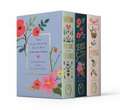Pride and Prejudice: Puffin in Bloom
Autor Jane Austen Ilustrat de Anna Bonden Limba Engleză Hardback – 13 feb 2024 – vârsta de la 12 ani
Preț: 89.80 lei
Nou
17.18€ • 18.04$ • 14.26£
Carte disponibilă
Livrare economică 20 martie-03 aprilie
Livrare express 05-11 martie pentru 25.88 lei
Specificații
ISBN-10: 0593622456
Pagini: 480
Dimensiuni: 131 x 182 x 37 mm
Greutate: 0.44 kg
Editura: Penguin LLC US
Colecția Puffin
Seria Puffin in Bloom
Notă biografică
Descriere
Pride and Prejudice: An Epistolary Edition Containing Nineteen Handwritten Letters is a collection of the letters exchanged between Jane Austen's characters in Pride and Prejudice. Glassine pockets placed throughout the book contain removable replicas of all 19 letters in the story. From Lydia's announcement of her elopement, to Mr.
Darcy's honest, beseeching missive to Elizabeth, this deluxe edition pays homage to the power of these epistles. * Nothing captures Jane Austen's vivid emotion and keen wit better than her characters' correspondence. * Each letter is re-created with gorgeous calligraphy.
* Letters are hand-folded with painstaking attention to historical detail. Perusing the letters will transport readers straight to the drawing room at Netherfield or the breakfast table at Longbourn. For anyone who loves Austen, and for anyone who still cherishes the joy of letter writing, this book illuminates a favorite story in a whole new way.
* Step inside the world of Pride and Prejudice, one of the most beloved novels of all time. * Great Mother's Day, birthday, or holiday gift for diehard Jane Austen fans * A visually gorgeous book that will be at home on the shelf or on the coffee table * Add it to the shelf with books like What Would Jane Do?: Quips and Wisdom from Jane Austen by Potter Gift, Jane-a-Day: 5 Year Journal with 365 Witticisms by Jane Austen Edition by Potter Gift, and The Real Jane Austen: A Life in Small Things by Paula Byrne.
Extras
It is a truth universally acknowledged that a single man in possession of a good fortune must be in want of a wife.
However little known the feelings or views of such a man may be on his first entering a neighbourhood, this truth is so well fixed in the minds of the surrounding families that he is considered as the rightful property of some one or other of their daughters.
"My dear Mr. Bennet," said his lady to him one day, "have you heard that Netherfield Park is let at last?"
Mr. Bennet replied that he had not.
"But it is," returned she; "for Mrs. Long has just been here, and she told me all about it."
Mr. Bennet made no answer.
"Do not you want to know who has taken it?" cried his wife impatiently. "You want to tell me, and I have no objection to hearing it."
This was invitation enough.
"Why, my dear, you must know, Mrs. Long says that Netherfield is taken by a young man of large fortune from the north of England; that he came down on Monday in a chaise and four to see the place, and was so much delighted with it that he agreed with Mr. Morris immediately; that he is to take possession before Michaelmas, and some of his servants are to be in the house by the end of next week."
"What is his name?"
"Bingley."
"Is he married or single?"
"Oh! single, my dear, to be sure! A single man of large fortune; four or five thousand a year. What a fine thing for our girls!"
"How so? How can it affect them?"
"My dear Mr. Bennet," replied his wife, "how can you be so tiresome! You must know that I am thinking of his marrying one of them."
"Is that his design in settling here?"
"Design! nonsense, how can you talk so! But it is very likely that he may fall in love with one of them, and therefore you must visit him as soon as he comes."
"I see no occasion for that. You and the girls may go, or you may send them by themselves, which perhaps will be still better, for as you are as handsome as any of them, Mr. Bingley might like you the best of the party."
"My dear, you flatter me. I certainly have had my share of beauty, but I do not pretend to be anything extraordinary now. When a woman has five grown-up daughters, she ought to give over thinking of her own beauty."
"In such cases, a woman has not often much beauty to think of."
"But, my dear, you must indeed go and see Mr. Bingley when he comes into the neighbourhood."
"It is more than I engage for, I assure you."
"But consider your daughters. Only think what an establishment it would be for one of them. Sir William and Lady Lucas are determined to go, merely on that account, for in general you know they visit no newcomers. Indeed you must go, for it will be impossible for us to visit him if you do not."
"You are over scrupulous surely. I dare say Mr. Bingley will be very glad to see you; and I will send a few lines by you to assure him of my hearty consent to his marrying whichever he chooses of the girls; though I must throw in a good word for my little Lizzy."
"I desire you will do no such thing. Lizzy is not a bit better than the others; and I am sure she is not half so handsome as Jane, nor half so good-humoured as Lydia. But you are always giving her the preference."
"They have none of them much to recommend them," replied he; "they are all silly and ignorant like other girls; but Lizzy has something more of quickness than her sisters."
"Mr. Bennet, how can you abuse your own children in such a way? You take delight in vexing me. You have no compassion on my poor nerves."
"You mistake me, my dear. I have a high respect for your nerves. They are my old friends. I have heard you mention them with consideration these twenty years at least."
"Ah! you do not know what I suffer."
"But I hope you will get over it, and live to see many young men of four thousand a year come into the neighbourhood."
"It will be no use to us if twenty such should come since you will not visit them."
"Depend upon it, my dear, that when there are twenty, I will visit them all."
Mr. Bennet was so odd a mixture of quick parts, sarcastic humour, reserve, and caprice, that the experience of three and twenty years had been insufficient to make his wife understand his character. Her mind was less difficult to develop. She was a woman of mean understanding, little information, and uncertain temper. When she was discontented she fancied herself nervous. The business of her life was to get her daughters married; its solace was visiting and news.
From the Paperback edition.
Recenzii
I read all of Jane Austen's novels very early on and learnt to love her economy of style and precision. She still seems to me the finest writer in the English language. Pride and Prejudice always bears another reading, and I think in many ways it is a perfect rendition of the novel form.
Jane Austen is one of my favourite writers... very acute, very perceptive, and writing in close and honest detail about the tiny preoccupations of women's lives - preoccupations which speak of much larger social and human issues.
Textul de pe ultima copertă
In a remote Hertfordshire village, far off the good coach roads of George III's England, a country squire of no great means must marry off his five vivacious daughters. At the heart of this all-consuming enterprise are his headstrong second daughter Elizabeth Bennet and her aristocratic suitor Fitzwilliam Darcy two lovers whose pride must be humbled and prejudices dissolved before the novel can come to its splendid conclusion."




























